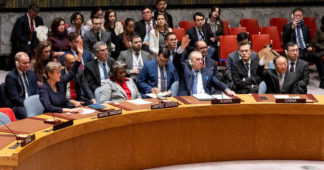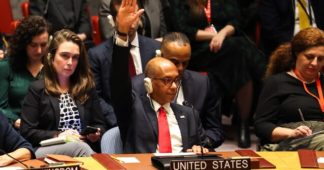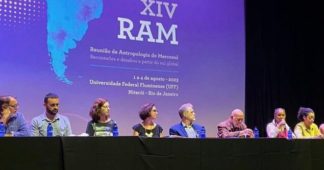“Academics will make careers out of writing about past atrocities while ignoring the ones happening in real time,” said one critic.
By Brett Wilkins
In what one observer decried as an “absolutely shameful” rebuff of American Historical Association members’ overwhelming approval of a resolution condemning Israel’s annihilation of education infrastructure in Gaza, the elected council of the nation’s oldest learned society on Thursday vetoed the measure over a claimed technicality.
AHA members voted 428-88 earlier this month in favor of a resolution opposing Israeli scholasticide—defined by United Nations experts as the “systemic obliteration of education through the arrest, detention, or killing of teachers, students, and staff, and the destruction of educational infrastructure”—during the 15-month assault on the Gaza Strip.
However, the AHA’s 16-member elected council voted 11-4 with one abstention to reject the measure, according toInside Higher Ed, which noted that the panel “could have accepted the resolution or sent it to the organization’s roughly 10,450 members for a vote.”
The American Historical Association says opposing scholasticide in Gaza lies outside the scope of its mission to broaden historical knowledge.
Seems like the intentional destruction of education—and everything else—in Gaza is relevant to broadening knowledge. Academics will make… https://t.co/Ao214Kunlq
— Assal Rad (@AssalRad) January 17, 2025
While the council said in a statement that it “deplores any intentional destruction of Palestinian educational institutions, libraries, universities, and archives in Gaza,” it determined that the resolution does not comply with the AHA’s constitution and bylaws “because it lies outside the scope of the association’s mission and purpose.”
Council member and University of Oklahoma history professor Anne Hyde told Inside Higher Ed that she voted to veto the resolution “to protect the AHA’s reputation as an unbiased historical actor,” adding that the Gaza war “is not settled history, so we’re not clear what happened or who to blame or when it began even, so it isn’t something that a professional organization should be commenting on yet.”
However, Van Gosse, a co-chair and founder of Historians for Peace and Democracy—the resolution’s author—told the outlet that “we are extremely shocked by this decision,” which “overturns the democratic decision” of members’ “landslide vote.”
Lake Forest College history professor Rudi Batzell said on social media: “Shame on the AHA leadership for vetoing the scholasticide in Gaza resolution. Members voted overwhelmingly to support, and the resolution was written so narrowly and so carefully to meet exactly this kind of procedural objection. Craven.”
The AHA council’s veto follows last week’s move by the Modern Language Association executive council, as Common Dreamsreported, to block members of the preeminent U.S. professional group for scholars of language and literature from voting on a resolution supporting the boycott, divestment, and sanctions movement for Palestinian rights.
We remind our readers that publication of articles on our site does not mean that we agree with what is written. Our policy is to publish anything which we consider of interest, so as to assist our readers in forming their opinions. Sometimes we even publish articles with which we totally disagree, since we believe it is important for our readers to be informed on as wide a spectrum of views as possible.











